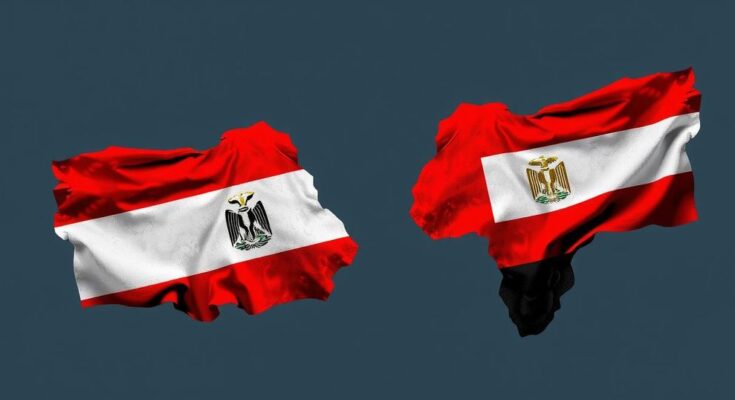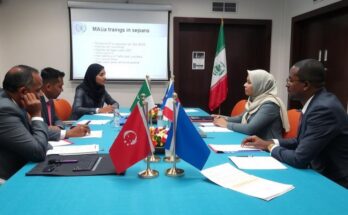Turkey and Egypt have engaged in high-level talks focused on the geopolitical situation in Africa, particularly addressing the ongoing dispute between Ethiopia and Somalia. The discussions emphasized collaboration on security and stability in the Horn of Africa and included cooperation in military support for Somalia. This meeting reflects a growing rapprochement between the two nations, historically seen as adversaries, now seeking common ground amid regional tensions.
On Monday, officials from Turkey and Egypt held discussions focused on the geopolitical landscape of Africa, particularly in relation to the ongoing dispute between Ethiopia and Somalia. This was marked by two rounds of talks aimed at fostering cooperation between the two nations, which have historically held opposing positions. The urgency of the discussions was underscored by tensions affecting the Horn of Africa and the Red Sea area. The Egyptian foreign ministry reported that the dialogues were led by Ihab Awad, Assistant Foreign Minister for African Affairs, and Elif Ulgen, Director General of Eastern and Southern Africa at the Turkish Ministry of Foreign Affairs. They achieved a mutual understanding on strategies to ensure security and stability within the Horn of Africa, which in turn would facilitate a restoration of maritime operations in the Red Sea. According to the Egyptian foreign ministry, Egypt and Turkey are committed to enhancing cooperation across various domains to fulfill their shared objectives concerning the Horn of Africa and the Red Sea, particularly in their collaborative support for Somalia in tackling terrorism and strengthening its national defense forces. The discussions also encompassed the situation in Libya, where both nations reiterated their commitment to ongoing consultations aimed at benefitting the Libyan populace. Despite their previous support for opposing factions within Libya, Turkey and Egypt have united in their backing of Somalia’s efforts. Earlier this year, Turkey formalized its military engagement with Somalia through a significant defense agreement, which includes monitoring Somali territorial waters. Egypt, on the other hand, has established a military collaboration with Somalia, involving Egyptian troops as part of a broader African peacekeeping initiative. Tensions between Ethiopia and Egypt were highlighted by Egypt’s military engagements, believed to counter Ethiopia’s influence in the region and its maritime agreement with Somaliland. Furthermore, the long-standing contention over the Grand Ethiopian Renaissance Dam along the Nile remains a critical issue for Egypt, which fears this will compromise its water security and resources. Recent diplomatic overtures, including Egyptian President Abdel Fattah al-Sisi’s visit to Turkey last September, reflect a significant thawing in relations, countering over a decade of hostility between the two nations. President Erdogan’s previous critiques of President Sisi following the 2013 coup that ousted Egypt’s first democratically elected leader, Mohammed Morsi, have certainly colored the historical backdrop of their dialogue. Moreover, Turkey has been speculated to have a potential role in mediating the ongoing conflict between Egypt and Ethiopia.
The geopolitical dynamics in the Horn of Africa are complex, characterized by historical animosities and current disputes that involve multiple nations. The tensions between Ethiopia and Somalia have significant implications for regional stability, particularly concerning maritime agreements that impact surrounding states. The ongoing conflict in Libya also complicates matters, as Turkey and Egypt support different factions, although both countries share interests in promoting peace and security in Somalia. Additionally, Egypt’s concerns regarding Ethiopia’s Grand Renaissance Dam introduce further challenges to trilateral relations within the region, emphasizing water security and resource management.
The recent talks between Turkey and Egypt signify a potential shift towards collaboration in addressing regional challenges, particularly in Somalia and the broader Horn of Africa context. The nations aim to restore stability, enhance maritime security, and support the Somali government in its fight against terrorism. This diplomatic engagement, grounded in mutual interests, could yield a more collaborative approach to addressing not only the Somali situation but also the intricate dynamics of the Eastern Mediterranean and North Africa.
Original Source: www.newarab.com




